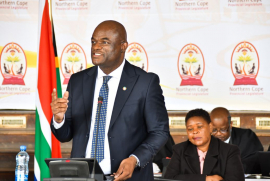
Northern Cape Premier Dr Zamani Saul says the provincial government is intent on breaking the back of youth unemployment in the province.
Other priorities are energy and the development of key infrastructure.
The Premier was delivering the State of the Province Address in Calvinia in the province’s Namawka District.
According to Saul, the province has the lowest youth unemployment rate in the country at 30.1% - a statistic he said the province is determined to address.
“We remain determined to continue to break the back of the persistent challenge of youth unemployment. The MEC responsible for Youth, Women, Disability, Children, Communication and e-Government will assemble an expert team that will assist us to come up with district based interventions to tackle youth unemployment.
“Furthermore… the MEC will interface, facilitate and coordinate extension of Youth Service Centres across the province, youth social cohesion initiatives, youth economic empowerment and youth health initiatives with all relevant sector departments and the private sector.
“We expect this team to conclude their work by August this year so that our focus moves towards practical implementation of their recommendations,” he said.
Saul reflected on the work done by the provincial government, which has produced training opportunities for thousands of youth.
“Through collaborative efforts a total of 11 852 unemployed youth benefitted from skills development programmes such as Internships, Learnerships, Apprenticeship, Artisanship, Work Integrated Learning and skills programmes.
“Furthermore the Provincial Government has entered into a multi-year partnership with MLAB South Africa for the provision of training of young people. The programme is designed to help participants acquire the much needed skills such as building WordPress websites, social media marketing and develop mobile Apps that will be tested via the Youth Service Centres.
“It is collectively these interventions that have made a positive impact on the reduction of the provincial unemployment rate especially amongst the youth,” he said.
Energy
Saul reflected on the current energy crisis that the country is facing and its impact on the province’s economy.
“The frequent load shedding is an impediment to conducting business in South Africa. Similarly, challenges in the transportation system limit the economic benefits from the commodity boom. Rising inflation hurts the purchasing power of low-income households and negatively affect the country’s competitiveness and financing costs.
“With all these challenges, the provincial economy grew by 2.0% in 2022. For 2023, the provincial economic growth is expected to be around 2.7%."
He said the province will be seeking ways to mitigate its impact, especially for small businesses, which have buckled under the pressure of the rolling power cuts.
“The province has developed a renewable energy strategy that focuses on rooftop solar PV installation. The strategy seeks to address the limited participation of small, medium and micro-scale enterprises in the renewable energy value chain.
“The objective is to assist the SMMEs in entering into power purchase agreements with the government and Private sector to acquire loan funding from banks to procure the PV systems. 51 SMME’s have received the PV Green card training. The Northern Cape Solar Energy Business Incubator (NOCSOBI) was also established and we will launch it in April 2023,” Saul said.
Infrastructure
Turning to infrastructure development and investment, the Premier said the provincial government will be spending some R9 billion on infrastructure projects throughout the MTEF.
According to Saul, these projects will be focused on building schools, health facilities, roads, housing, energy, water and sanitation.
“This infrastructure portfolio will be further enhanced through the receipt of additional capital investment via the application and sourcing of additional funding to realise the objective of economic growth through infrastructure delivery.
“Infrastructure investment is the backbone of a thriving economy. Through the implementation of an integrated infrastructure growth path the province will be able to improve the socio-economic conditions of the residents of the Northern Cape,” he said.
Saul said road infrastructure will also receive attention.
“Despite lack of a sufficient budget to service our provincial roads, we are committed to increase access to affordable and reliable transport infrastructure. The Province also transferred 16 roads over to SANRAL on 2 November 2022. This will help the Province to focus on roads which are used mainly by local motorist.
“A pivotal development related to the latter is the fact that SANRAL will also be opening an office here in the Northern Cape; this will help to strengthen focus on our roads which are critical to the success of our provincial and the national economy,” he said. – SAnews.gov.za


